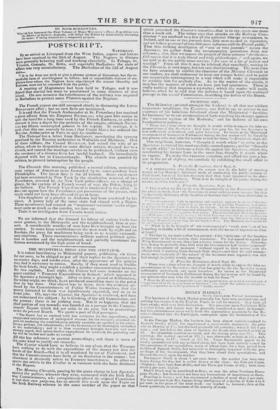THE MINISTERIAL PRESS AND THE SPECTATOR.
It is rather humiliating to Ministerial papers, publishing six times for our once, to be obliged to put off their replies to the Spectator for successive days, and weeks even, after the appearance of the articles they find it necessary to notice. Surely, if they must send to Dublin for their briefs, they might establish a quicker communication between the two capitals. Last night, the Courier had some remarks on the paper entitled " Treasury Expenditure in Ireland," which appeared in the Spectator a fortnight ago. After so long a pet iod of deliberation, the writer might, we think, have produced something more to the point than be has done. Our object was to show, from the evidence ad- duced by the Commissioners of Public Works themselves, that the money intrusted to them was injudiciously expended, and so as to
foster jobs. Oh, says the Courier, the Spectator is confused, and does not understand the subject : he is thinking of the old Commission, not the present; there is no jobbing now. But it so happens, that the chief portion of our remarks was founded on a passage in the Commis- sioners' Report which did not refer to the past, but to proceedings under the present Board. We quote a part of' that passage-
" The I3oaril has to contend with low estimate's for the expenditure, and exaggerated calculations of anticipated revenue fur the receipts; essential ob. jects for rendering the establishment entirely available are omitted in the caleu. !mums, perhaps rent intentionally, till the Government be thoroughly embarked in the uutlertaking; and it hi then sometimes brought lot ward, and even strongly urged, that unless further expenditure be incurred, the preceding out- lay will be useless and make no return."
All this has reference to present proceedings; and there is more of the same kind to justify our remarks. The Courier would have us believe, in one place, that the Treasury have nothing to do with the expenditure of the money put into the hands of the Board—that it is all regulated by act of Parliament, and
that the Commissioners have little or no discretion in the matter : but elsewhere it distinctly refers to Treasury interferenee. Iri other re- spects the article in the atlfier is at variance with the facts disclosed in the Report.
The Morning Chronicle, passing by the grave charge in last Spectator against the parties, whoever they were, connected with the Irish Rail-
way Commissioners, who surreptitiously altered the original Commission to suit !heir own purposes, has an article this week upon the Topic on the Insh Railway scheme in the same number of the paper as that
which provoked the Courier's remarks—that is to say, upon one more than a week old. The writer says that attacks on the Railway Com- mission "are confined to a few of the paltriest Orange newspapers in Ireland, and to one or two journals here, little more exalted in reputation, and we helieve possessed of verse little more influence with the British public." That this striking description of "one or two journals" means the Spectator, we gather from the accompanying quotations from our columns ; also, that we oppose the project of these persons "for the two- fold reason that it is truly liberal and truly philanthropic ;" and again, we are told to do the public some service, "for once in a life tf faction and mischief." From all this it may be inferred, that somebody, writing in the Chronicle, is very angry, but not very discriminating. The next time we have occasion to exhibit the character of the Morning Chronicle to our readers, we shall endeavour to keep our temper better, and to paint our respectable contemporary in a way which will make it impossible to mistake him for anybody else. As to the matter of the article, it matches the manner, of which we have just had specimens. There is really nothing that requires a rejoinder ; which the reader will easily believe, when he is told that the defence is based upon the mutilated passage in the second Commission, describing the duties of the Board.


























 Previous page
Previous page